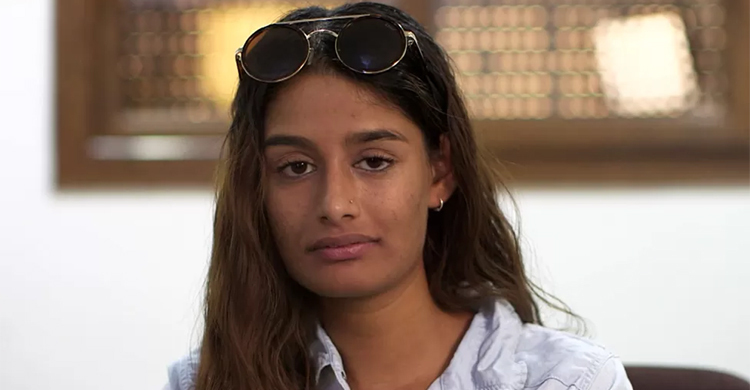Shamima Begum bid to regain UK citizenship rejected

Shamima Begum has lost her challenge over the decision to deprive her of British citizenship despite a "credible" case she was trafficked.
Mr Justice Jay told the semi-secret court dealing with her case that her appeal had been fully dismissed.
The ruling means the 23-year-old remains barred from returning to the UK and stuck in a camp in northern Syria.
Her legal team said the case was "nowhere near over" and the decision will be challenged.
Ms Begum was 15 years old when she travelled to join the self-styled Islamic State group in 2015.
She went on to have three children, all of whom have died, after marrying a fighter with the group.
In 2019, the then home secretary Sajid Javid stripped her of her British citizenship, preventing her coming home, and leaving her detained as an IS supporter in a camp.
The Special Immigration Appeals Commission has ruled that decision, taken after ministers received national security advice about Ms Begum's threat to the UK, had been lawful - even though her lawyers had presented strong arguments she was a victim.
During the appeal hearing last November, Ms Begum's lawyers argued the decision had been unlawful because the home secretary had failed to consider whether she had been a victim of child trafficking - in effect arguing she had been groomed and tricked into joining the fighters, along with school friends.
That was the first time judges had to consider whether the state's obligations to combat trafficking and abuse of children should have any influence over national security decisions.
Mr Justice Jay revealed the complexity of the case had caused the panel of three "great concern and difficulty".
"The commission concluded that there was a credible suspicion that Ms Begum had been trafficked to Syria," he said in his summary.
"The motive for bringing her to Syria was sexual exploitation to which, as a child, she could not give a valid consent.
"The commission also concluded that there were arguable breaches of duty on the part of various state bodies in permitting Ms Begum to leave the country as she did and eventually cross the border from Turkey into Syria."
But despite those concerns, the judge said even if Ms Begum had been trafficked, that did not trump the home secretary's legal duty to make a national security decision to strip her of her British nationality.
"There is some merit in the argument that those advising the secretary of state see this as a black and white issue, when many would say that there are shades of grey," said the judge in his summary.
Previous legal failures
But despite those questions over how the case had been handled, the commission concluded the home secretary had still acted within his powers - even if there could have been a different outcome.
"If asked to evaluate all the circumstances of Ms Begum's case, reasonable people with knowledge of all the relevant evidence will differ, in particular in relation to the issue of the extent to which her travel to Syria was voluntary and the weight to be given to that factor in the context of all others," said the judge.
"Likewise, reasonable people will differ as to the threat she posed in February 2019 to the national security of the United Kingdom, and as to how that threat should be balanced against all countervailing considerations.
"However, under our constitutional settlement these sensitive issues are for the secretary of state to evaluate and not for the commission."
This isn't the first time a legal challenge by Ms Begum's lawyers has failed. In February 2020 the same commission rejected her team's argument that she had been made "de facto stateless" when her citizenship was removed.
It agreed with the Home Office's position that since she was technically entitled to Bangladeshi citizenship, it wasn't legally obliged to allow her to keep her UK rights.
In February 2021, the Supreme Court said she could not return to the UK to fight her case on security grounds.
'Troubling findings'
In a statement, Ms Begum's lawyers Gareth Pierce and Daniel Furner called on Suella Braverman, the current home secretary, to look at the case again "in light of the commission's troubling findings".
They said the decision removes protections for British child trafficking victims in cases where national security is involved and leaves their client "in unlawful, arbitrary and indefinite detention without trial in a Syrian camp".
Her legal team said "every possible avenue to challenge this decision will be urgently pursued" without providing further details of any potential appeal.
A spokesman for the Home Office said it was "pleased" with the outcome, adding: "The government's priority remains maintaining the safety and security of the UK and we will robustly defend any decision made in doing so."
Mr Javid also welcomed the ruling. Ministers must have the "power to prevent anyone entering our country who is assessed to pose a threat to it", he said.
Human rights groups and campaigners have criticised the ruling and the government's position, maintaining that Ms Begum was a child exploitation victim.
Steve Valdez-Symonds, Amnesty International UK's refugee and migrant rights director, said: "The home secretary shouldn't be in the business of exiling British citizens."
Conservative MP David Davis, who has repeatedly challenged the government on civil liberties issues, described the situation as a "shameful abdication of responsibility and must be remedied".
Source: BBC



